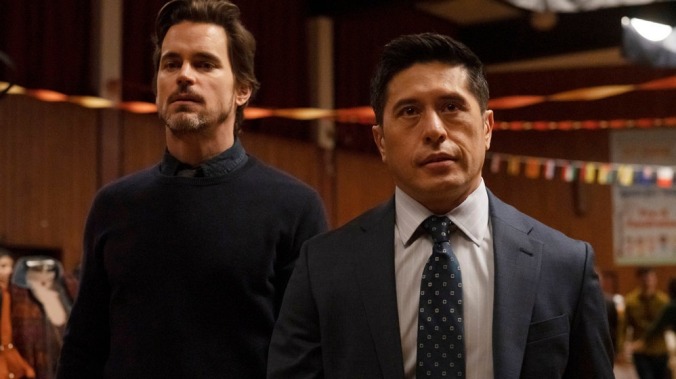A leap of faith is usually symbolic, not literal. People choosing to trust in a higher power, themselves, or another hope that they’re making the right choice, armed with nothing more than the conviction it’s the right thing to do. Not so for college-aged Jamie Burns or Nick Haas, for whom the leap is an actual, physical one. Halfway through this episode’s multiple flashbacks, Nick and Jamie stand on a bridge; Nick pulls out his fortune teller, Jamie randomly picks a number and color, and it tells Nick to jump. By episode’s end, college-age Jamie has done the same. And—at the very end—modern-day Harry makes his own leap of faith, one which ends with his being buried alive. To quote another show focused on the nature of innermost human existence: These violent delights have violent ends.
“Part VI” takes the opportunity to look back at the origins of Nick and Jamie’s Nietzschean friendship, the development of the pyrrhic bond that would return to consume them both 20 years later. We see their meet-cute in philosophy class, where they were 100% the annoying guys who kept interrupting normal discussion to be like, “But isn’t the idea of an all-powerful God a logical fallacy?” while the other students roll their eyes. (Man, those kinds of guys were the worst, weren’t they?) And while it’s interesting to see the way Nick functioned as a catalyst for Jamie’s more extreme tendencies, it’s also not exactly surprising. These scenes play out more or less as you would’ve imagined, and while director Radium Cheung keeps them awash in the muted color scheme signifying the past, there’s nothing to make them stand out in any noteworthy way, given the predictable character-study elements.
Luckily, the current events playing out in Dorchester are hurtling forward with such momentum, the flashbacks don’t detract from the episode’s pacing. Harry, violating his orders to stay out of the way and stick to his desk, visits Leela, who has only one thing on her mind: “Did he do it?” The detective confirms her fears—yes, her husband murdered a man, and no, we don’t know why. Leela paints a picture of a man who wouldn’t hurt a fly, saying he’s never gotten angry in the entire history, of their relationship, even when it seemed like the only appropriate response. That would seem to be a red flag in its own right—who never gets angry?—but doesn’t help Harry build his case. Of course, Harry’s looking for a magic bullet, the one thing that defines whatever trauma is driving Jamie, and as Sonya says, there might not be one. “What if it’s not one thing? Just a life. Little things,” she suggests, constructing Jamie’s life as one of quiet desperation—a man who just wants to be seen and heard, not relegated to the normal ebbs and flows of life. Someone who has kept himself on mute for so long, the button broke, and now he can’t stop the flow of overwhelming noise surging through his mind.
Not that Sonya’s in any position to evaluate who is and isn’t in a sound mental frame of mind. The artist reveals her own dangerous obsession with authenticity and intensity in this episode: When Jamie breaks into her house, rather than calling the cops and keeping her shotgun trained on this man she knows is a killer, she lowers the gun, asks him to strip naked, and walks right up to him, taking photos and trying to capture some inner life she thinks he’s kept hidden from view. Sonya has underplayed her own emotional turmoil; that’s not the act of someone looking to keep away from drama. Instead, it’s the logical endpoint of her obsession (her own leap of faith, if you will), which began with surreptitiously photographing Jamie from afar, only to push closer and closer to his life, all but daring him to make contact. No wonder she isn’t surprised when he shows up and walks right in; Sonya basically hung a “dangerous visitors welcome” sign on the door.
By contrast, Leela is trying to maintain some practical distance from her estranged spouse, in large part because she’s having trouble wrapping her head around the idea that this man has been hiding deep inside her husband all along. The scenes with Jamie and Leela are among the most uncomfortable, in part between Matt Bomer and Parisa Fitz-Henley are doing excellent work conveying the fraying bonds of intimacy which lie beneath their fraught exchanges. At any given moment—even when he’s confessing to murder, for heaven’s sake—the two actors radiate the connection between two people who don’t understand how they could’ve ended up in this place. She’s hurt and scared, keeping her emotions guarded while letting her eyes communicate the inescapable care she still feels for this man; he’s haunted and frantic, desperate to reestablish a fundamental bond he knows is hanging by a thread. When Jamie arrives at the silent auction against Leela’s wishes, it’s painful to watch even before the teacher loses his cool and shouts at their friend Brian to leave him along with his wife, turning the already public spectacle into a disaster.
But for all the seeming attention to Jamie’s psyche, the specter of Harry and his own demons are the true unknown quantity underlying this narrative. I speculated last week that Harry was the real subject of inquiry this season, with the already largely exhausted story of Jamie Burns only gaining renewed intensity thanks to the way Harry is being inexorably pulled into the orbit of this would-be ubermensch. His own fraying family bonds are doubtless contributing to his impetuous choices—his family are no longer coming for Thanksgiving, thanks to Harry’s attack on Jamie in front of his grandson Eli—but it’s the way Harry sees elements of his own existential pain in Jamie that causes him to do foolish things like willingly crawl into a coffin and be buried alive.
Harry has always been looking for something more intense, more extreme, than the everyday life in which we all live. Season one, it was the BDSM affair that he kept returning to, an affair that torpedoed his marriage. In season two, it was diving headlong into a case that wasn’t his, wanting to plunge into the depths of a strange cult with no guarantee he would come out the other end. And now, Harry Ambrose is joining Jamie in a death-defying live burial, hoping the awakening Jamie promised would be on the other side. He probably wasn’t counting on the breathing tube being snatched away, but you can’t deny it sparked something awake in him. Harry’s life-or-death situation probably isn’t fatal (I don’t think Jamie actually wants to kill him, just wants him to have one of those near-death experiences that Nick and he found so enlightening), but it might be the last nail in the coffin for his trust in Jamie.
Stray observations
- “Here we go round the prickly pear.” For those who’d like to read the whole thing, T.S. Eliot’s “The Hollow Men”—an excellent poem about stasis, immobility, and the sense of feeling trapped—is well worth a look.
- Sonya and Jamie’s late-night meetup, where he disrobes for her, was my favorite scene this episode. Dark, creepy, and weirdly erotically charged, it was like something out of a David Cronenberg movie.
- I also liked the touch of Jamie giving Harry his signed murder confession as an enticement to participate in the burial ritual.
- Kudos to the casting director who dug up those actors to portray young Jamie and Nick, they were uncannily similar in appearance to Bomer and Messina. Also, their voices were overdubbed by the older actors, right? There’s no way they also sound that much alike.
- I didn’t even get to Emma and her Adderall overdose. Poor kid, even the show treats her as an afterthought.
- I always find it odd when supposed radicals say things like “We’re living the wrong way, nobody seems to care”—Jamie says it this episode—as though that’s some boldly divergent thought from the self-help section of every bookstore. People are always dissatisfied, Jamie. This is capitalism—a system that not only creates dissatisfaction, but thrives on it. It needs people to always want more. Hell, before he died, Nick seemed to embody the good capitalist, no?


